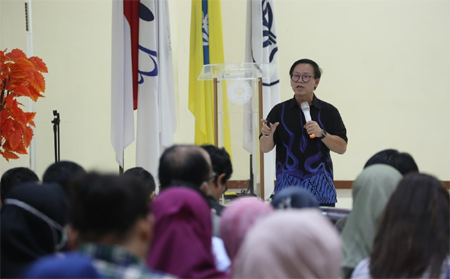FMIPA IPB University Public Lecture Delivers Genome Editing Technology

Biotechnology is a potential field that can accelerate the development of health and agricultural technology. One method that is developing in the field of biotechnology is genome editing. The Bioinformatics Working Group (WG) of the Faculty of Mathematics and Natural Sciences (FMIPA) IPB University held a public lecture that discussed the opportunities and challenges in the development of this genome editing technology. The public lecture that was held on Thursday (1/23) in the Auditorium of FMIPA IPB University received high enthusiasm from the participants.
According to information from Dr. Wisnu Ananta Kusuma, coordinator of WG Bioinformatics FMIPA IPB University, noted that this public lecture was attended by 235 participants from lecturers, students, researchers, and practitioners from various educational, research and industrial institutions. This public lecture was also recorded and broadcast online through the youtube channel Bioinformatics FMIPA IPB (http://bit.ly/bioinformatics-fmipa-ipb-university).
The Vice Dean for Resources, Collaboration and Development, FMIPA IPB University, Dr. Ir Hamim, in his remarks stated that this public lecture was aimed at conveying and disseminating research results in the field of science and its increasingly broad challenges both in Indonesia and abroad. "This is a small part of a large series relating to biodiversity in Indonesia. FMIPA IPB University strives to keep abreast of the latest science and technology developments and invites various parties to collaborate in conducting research and innovation development. In the field of biotechnology, genome editing is one technique that promises to find innovations in the fields of health and agriculture, in addition to the many challenges, "said Dr. Hamim.
This public lecture presented Prof. Antonius Suwanto, PhD who is a lecturer in the Department of Biology, FMIPA, IPB University and Dr. Riza Arief Putranto, a researcher at the Indonesian Center for Biotechnology and Bioindustry Research (PPBBI). On this occasion, Prof. Antonius said that science became an important basis for genetic engineering and genome editing. According to the lecturer in the Department of Biology FMIPA IPB University, various answers to biological phenomena or the construction of genetically modified products (GMOs) are produced from this technique. "Now the editing of genomes, especially those based on CRISPR, has provided new insights in modifying genetic material of living things with broad implications, even becoming one of the important technologies in facing the digital era, especially in developing important strategies for the sustainability of agriculture, food, industry, medical, and environment, "said Prof. Antonius.
Meanwhile, Dr. Riza completes Prof. Antonius's conceptual and philosophical explanations with concrete examples of the application of CRISPR-Cas9 to oil palm plants. One of the motivations for the use of CRISPR-Cas9 is because it has revolutionized classical genetic engineering techniques. In addition there have been no studies using CRISPR-Cas9 in Indonesia.
Dr Riza stated that in general the successful application of CRISPR technology involved three aspects that could not be separated from each other, namely the need for genetic material, bioinformatics skills (sgRNA design and selection of target genes in the omics database), and validation of the organisms that were edited.
"This research is not easy. The twists and turns of the application of CRISPR technology, especially in annual plants gave rise to what is referred to as the "labyrinth of research", even though the editing technique of this genome was considered fast and versatile by the public. This is the challenge, "he said. On the same occasion, the Indonesian Bioinformatics and Biodiversity Society (MABBI) association was introduced by the chairman, Dr. Ir Kholis Abdurachim Audah. MABBI, which has 250 members, aims to facilitate academics, scientists and practitioners at home and abroad to jointly develop Indonesia through the development of research in the field of Bioinformatics and Biodiversity in Indonesia. (IAAS/NAS)



